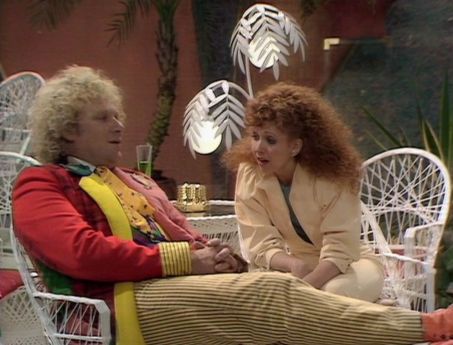
Family Album was described by Coward as “a sly satire on Victorian hypocrisy”. It’s set in the comfortable drawing room of the Featherways family, who have just returned from their father’s funeral. The atmosphere is decidedly formal to begin with, but when the new head of the household, Jasper (Denis Quilley), suddenly breaks into song for no particular reason it triggers a rapid lightening of mood ….
This one has quite the cast. I never knew that Denis Quilley could sing, but sing he does (as do several other cast members – which explains, in part, why the likes of Bonnie Langford and Jessica Martin appear today). It’s a slight pity that all the songs were clearly pre-recorded (when Jasper launches into the first song, Quilley’s voice suddenly gains a large dollop of recording studio echo) but since this isn’t the sort of playlet where realism is key, let’s not quibble.
Joan Collins has undergone yet another transformation. Sporting a rather uncomfortable set of teeth, I doubt she’s ever looked quite as unglamorous as she does here. She’s cast as Lavinia, the eldest daughter of the family, and the one who – initially at least – is by far the most prim and proper. A spinster, and likely to remain so, she begins by casting a disapproving eye when the others begin to make slightly merry, but after swigging some wine she soon gets into the spirit of things.
This isn’t the play with Collins’ largest role, but Lavinia still manages to make the most important story contribution.
She reveals towards the end that their father had made a new will just before he died, leaving some of his money to his several mistresses and the rest to a new church, which was due to contain a gaudy memorial to himself. Lavinia – with the assistance of Burrows, the butler – destroyed the will, thereby ensuring that the family would all receive their inheritances.
Although it was broadcast nearly thirty years ago, it still slightly takes the breath away to remember this was transmitted on BBC1. It’s hard to imagine such a piece, even with this sort of top quality cast, slotting into the schedule today. Goodness knows what the audience watching at the time made of it – personally I love it, but the way the characters continually break into song with no warning would probably have taken most people by surprise. And maybe it wouldn’t have been a pleasant surprise …
Especially since the opening few minutes would have primed them to expect something quite different – a bleak(ish) drawing room playlet. The way the rug is pulled from beneath the audience’s feet by the reveal that not only was the late head of the household an incurable letch but also that his children (all seemingly stolid and staid citizens) find it very easy to revert to the innocence of childhood at the drop of a hat, is a little stroke of genius.
Dominic Jephcott and Charles Collingwood are further strong additions to the cast whilst John Alderton seems to having a whale of a time as Burrows, the ancient family retainer. Sporting reasonably convincing old-age make up, Alderton manages to milk each comic moment for everything it’s worth.
I’m happy to report there was no laugh track on this one, so hopefully the remainder of the series will be equally unaffected.
Family Album is an odd treat from a series that continues to surprise and entertain.
















